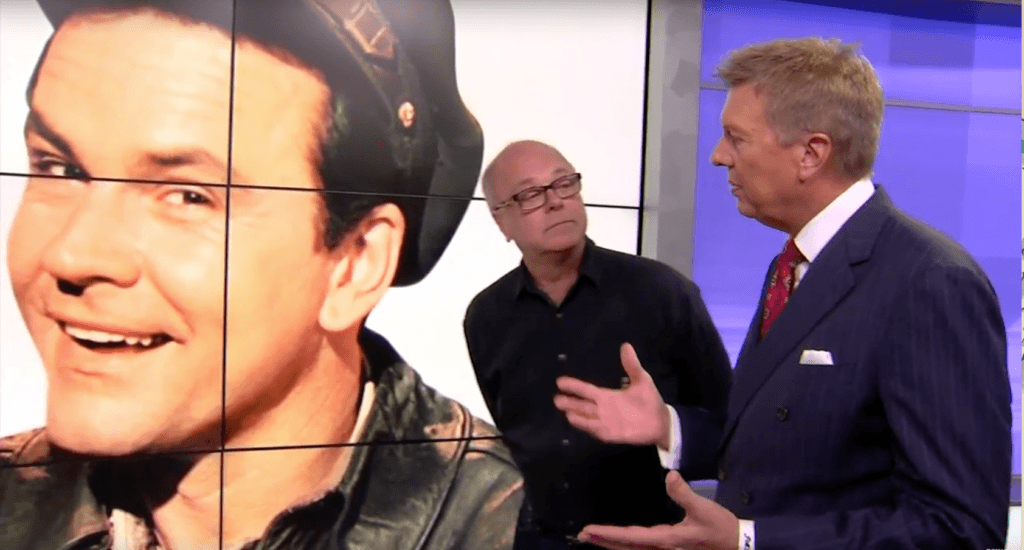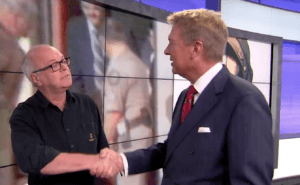 How do you tactfully ask a man about his father’s murder? That’s the dilemma reporters face when interviewing families of murder victims. It’s never easy, and every reporter dreads it.
How do you tactfully ask a man about his father’s murder? That’s the dilemma reporters face when interviewing families of murder victims. It’s never easy, and every reporter dreads it.
My book, “Who Killed Bob Crane?” was born from an interview I did with Bob Crane’s oldest son, Robert Crane Jr. in April of 2015. Close friend and photographer Joe Tillman discovered that Robert would be in Phoenix promoting his new book, “Crane: Sex, Celebrity, and My Father’s Unsolved Murder.” He agreed to come to the Fox 10 studios to talk to me about the book.
Robert Crane Jr. showed up at the studio with his wife Leslie and we chatted in the lobby for a few minutes. I realized very quickly that despite my own anxiety with interviewing him about his father’s murder, Robert. was very comfortable talking about it. This, after all, had been with him for nearly 40 years. As heartbreaking as it was to lose his father in a vicious crime, this was now part of his reality. The murder had sadly become another chapter in his father’s story.
But there was no mistaking the profound sense of loss Robert felt. The pain was only compounded by the fact that after all these years he still couldn’t be certain who killed his father.
This all struck me as terribly cruel.
As I describe in the book, this interview stuck with me for days afterword. I couldn’t stop thinking about the Crane case and the fact that there was still no resolution after 38 years.
In my last article, I wrote about how I came up with the idea to retest the DNA evidence in the Crane case. The first person I called with the idea was Robert Crane Jr., who had become a friend of mine after our interview. In the book, I tell the story of that first phone call.
 I was concerned that he might be offended at the idea of retesting it. I thought he might be of the mind set, “let sleeping dogs lie.” I thought perhaps he didn’t want to open up old wounds. But when I told Robert about my idea to retest the DNA evidence, he was thrilled. He told me he would cooperate and support my investigation in any way he could. I was blown away that no one had thought of it before. I figured certainly National Geographic or Discovery or one of the many crime documentary outfits would have jumped on this by now. But to my surprise, Robert assured me it had not been done. During that phone call, Robert even said, “If you need DNA for comparison purposes to my father, I could provide it.” He was right of course. As Bob Crane’s oldest son, his DNA would be a direct link to his father.
I was concerned that he might be offended at the idea of retesting it. I thought he might be of the mind set, “let sleeping dogs lie.” I thought perhaps he didn’t want to open up old wounds. But when I told Robert about my idea to retest the DNA evidence, he was thrilled. He told me he would cooperate and support my investigation in any way he could. I was blown away that no one had thought of it before. I figured certainly National Geographic or Discovery or one of the many crime documentary outfits would have jumped on this by now. But to my surprise, Robert assured me it had not been done. During that phone call, Robert even said, “If you need DNA for comparison purposes to my father, I could provide it.” He was right of course. As Bob Crane’s oldest son, his DNA would be a direct link to his father.
As you’ll read in the book, after the murder, blood stains were discovered in the the rental car of Bob Crane’s close friend, John Carpenter. When those stains were tested in 1978, the blood was determined to be Type-B positive – found in only 9-percent of the population. Bob Crane’s blood type happened to be, you guessed it, Type-B positive.
But DNA testing wasn’t available at the time to determine if the blood in the car was actually from Bob Crane.
38 years later that’s what I was determined to find out. Who’s blood was in that car? If it was from Bob Crane, John Carpenter was almost certainly the killer. The jury in Carpenter’s trial agreed, but the DNA testing in the 90’s was inconclusive.
Perhaps new tests paired with Robert Crane Jr.’s DNA could finally give us an answer.

Recent Comments